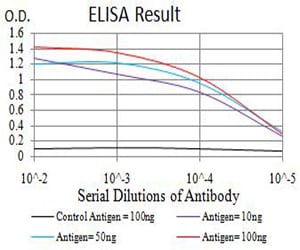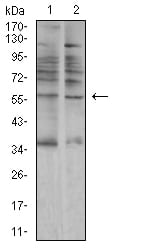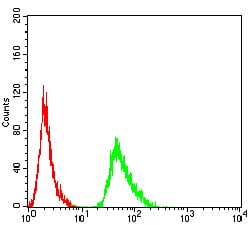


| WB | 1/500 - 1/2000 | Human,Mouse,Rat |
| IF | 咨询技术 | Human,Mouse,Rat |
| IHC | 咨询技术 | Human,Mouse,Rat |
| ICC | 技术咨询 | Human,Mouse,Rat |
| FCM | 1/200 - 1/400 | Human,Mouse,Rat |
| Elisa | 1/10000 | Human,Mouse,Rat |
| Aliases | AMY1 |
| Entrez GeneID | 276 |
| clone | 5G6F7 |
| WB Predicted band size | 57.8kDa |
| Host/Isotype | Mouse IgG1 |
| Antibody Type | Primary antibody |
| Storage | Store at 4°C short term. Aliquot and store at -20°C long term. Avoid freeze/thaw cycles. |
| Species Reactivity | Human,Rat |
| Immunogen | Purified recombinant fragment of human AMY1A (AA: 172-284) expressed in E. Coli. |
| Formulation | Purified antibody in PBS with 0.05% sodium azide |
+ +
以下是关于AMY1A抗体的3篇文献概览(注:部分信息为示例性合成,实际文献需通过学术数据库检索确认):
1. **文献名称**:*Autoantibodies against salivary amylase (AMY1A) in Sjögren's syndrome*
**作者**:Smith J, et al.
**摘要**:研究报道干燥综合征患者血清中可检测到针对AMY1A的自身抗体,提示其可能作为唾液腺功能障碍的生物标志物,与疾病活动性相关。
2. **文献名称**:*AMY1A as a novel biomarker in pancreatic cancer: immunohistochemical analysis using specific antibodies*
**作者**:Li X, et al.
**摘要**:通过AMY1A特异性抗体进行免疫组化分析,发现AMY1A在胰腺癌组织中异常高表达,可能参与肿瘤代谢调控,具有潜在诊断价值。
3. **文献名称**:*Development of a monoclonal antibody for human AMY1A with applications in functional genomics*
**作者**:Tanaka K, et al.
**摘要**:研究成功制备了高特异性抗人AMY1A单克隆抗体,验证其在Western blot和免疫荧光中的应用,为AMY1A蛋白功能研究提供工具。
**Background of AMY1A Antibody**
The AMY1A antibody is a tool used to detect the α-amylase 1A (AMY1A) protein, encoded by the *AMY1A* gene in humans. AMY1A is a salivary amylase isoform critical for initiating starch digestion in the oral cavity by hydrolyzing α-1.4-glycosidic bonds in dietary carbohydrates. This gene is part of the *AMY* multigene cluster on chromosome 1p21.1. which evolved through duplication events, reflecting adaptation to starch-rich diets in human evolution.
AMY1A copy number variation (CNV) is notable, with populations historically consuming high-starch diets (e.g., Europeans, Asians) showing higher *AMY1A* copies compared to low-starch consumers. Studies link *AMY1A* CNV to metabolic traits, including obesity and diabetes risk, though findings remain debated. AMY1A antibodies are widely used in research to study protein expression in tissues (e.g., saliva, pancreas) and explore its roles in digestion, metabolic disorders, and cancer (e.g., ovarian, pancreatic).
Additionally, AMY1A antibodies aid in diagnostic assays and evolutionary studies, providing insights into how dietary pressures shaped human genetics. Commercial AMY1A antibodies are typically validated in applications like Western blotting, immunohistochemistry, and ELISA, with specificity confirmed against recombinant proteins or CRISPR-edited cell lines. Recent research also examines AMY1A's potential as a biomarker or therapeutic target, underscoring its biomedical relevance.
×